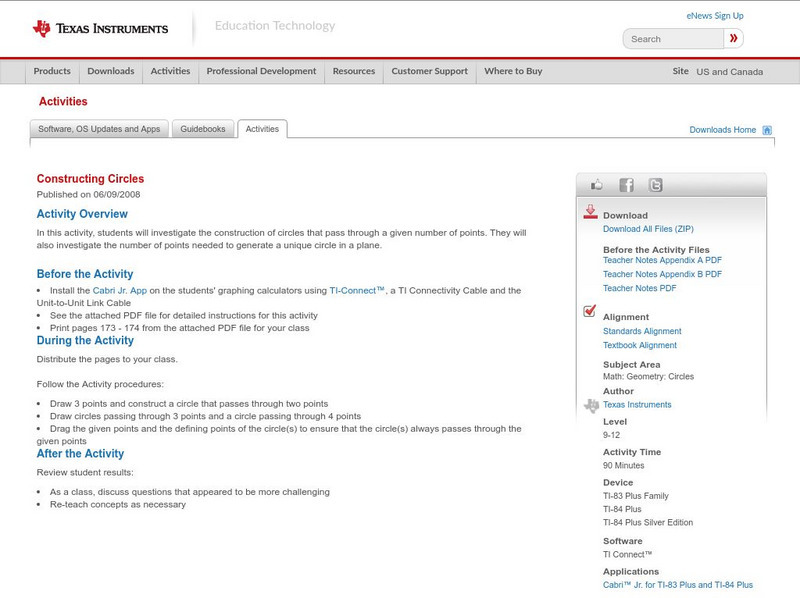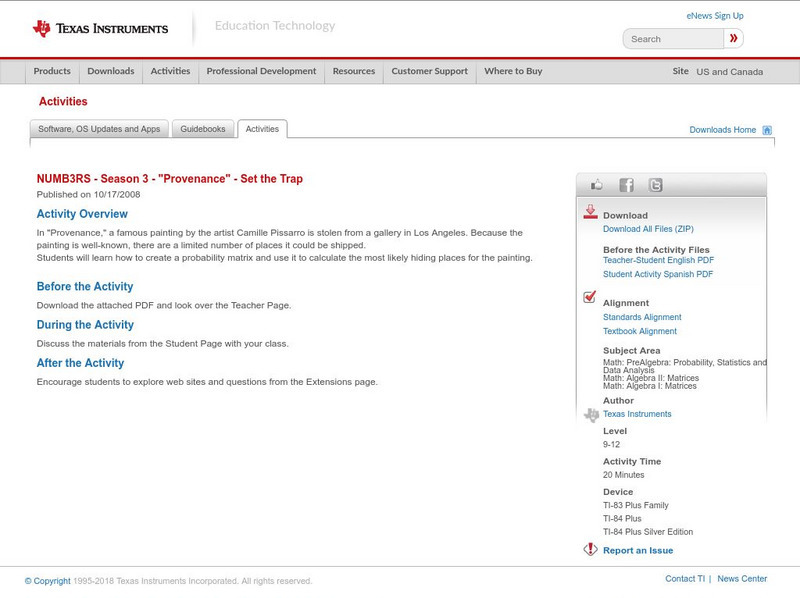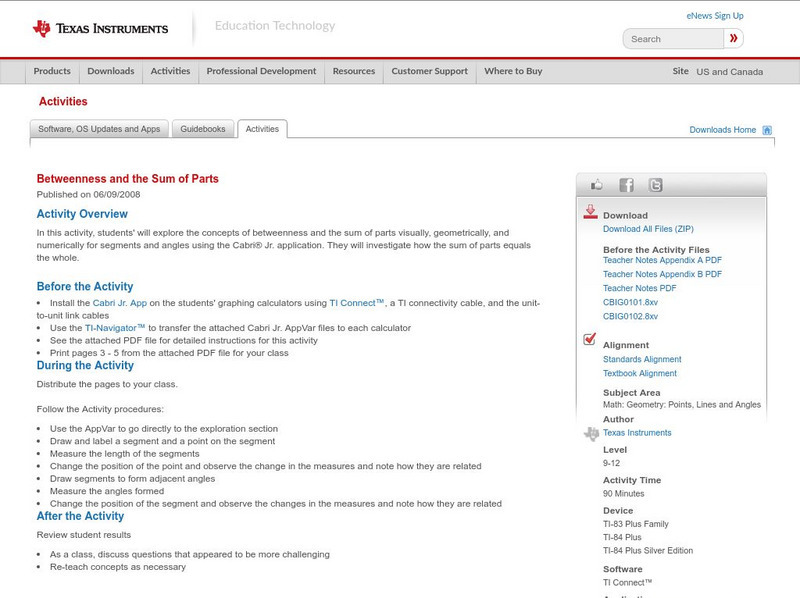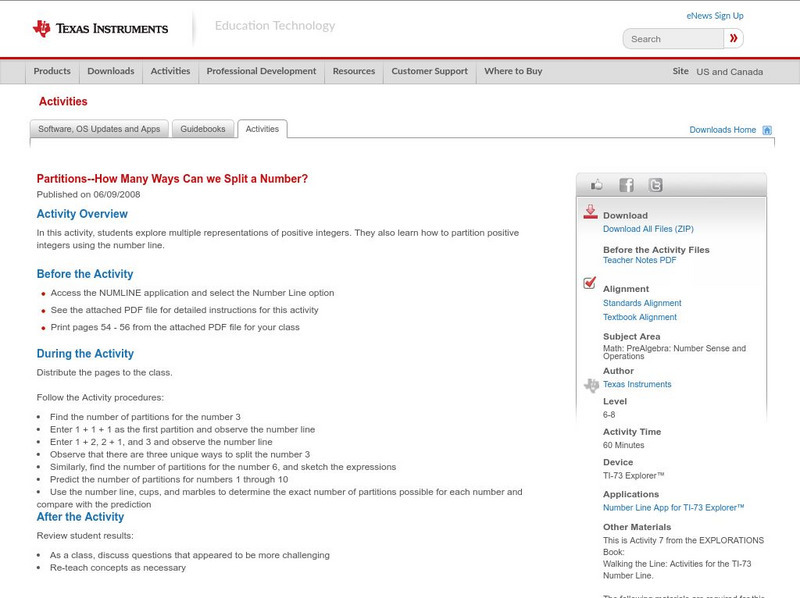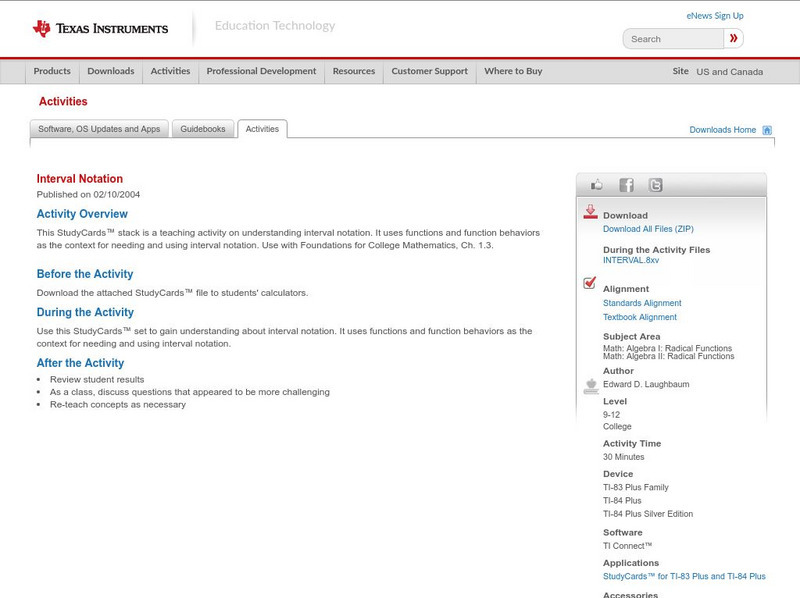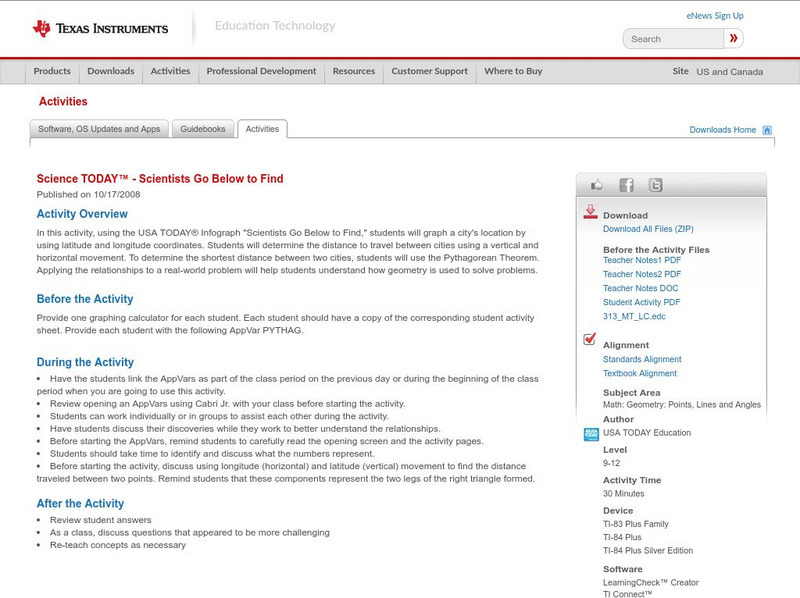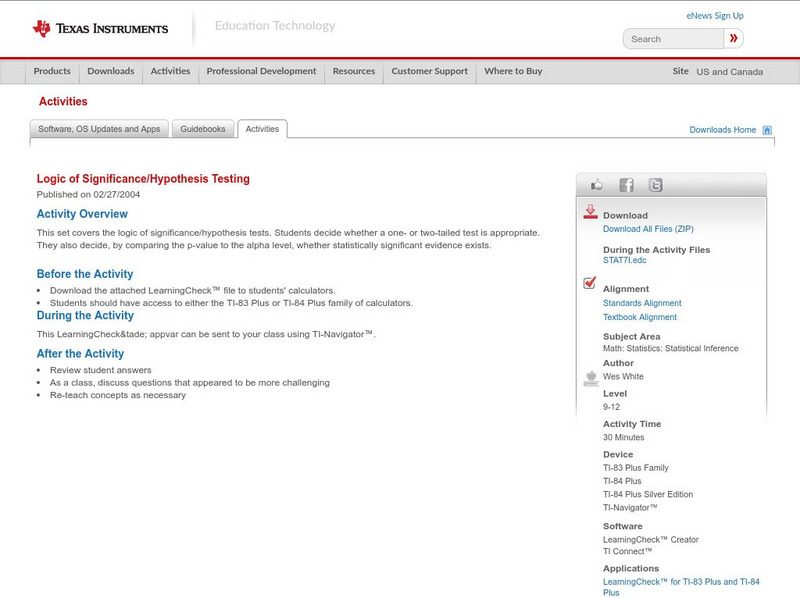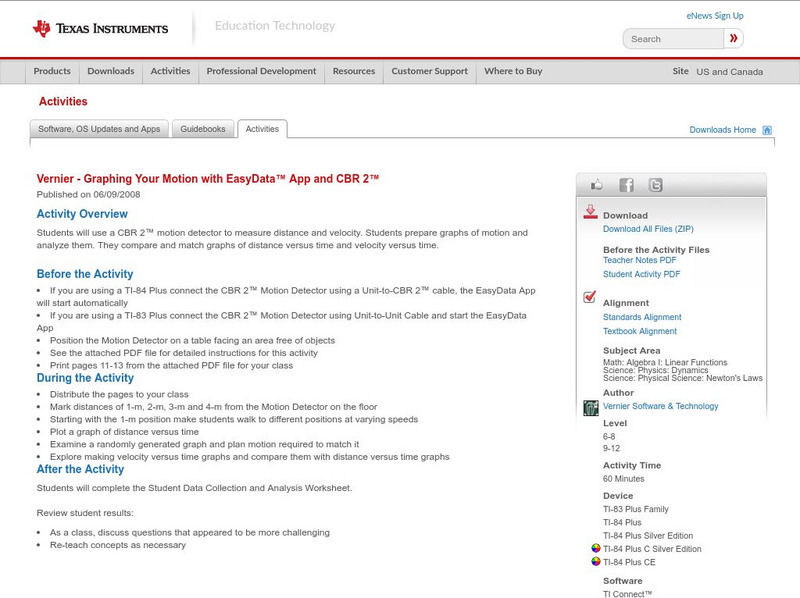Texas Instruments
Texas Instruments: Numb3 Rs: Are You Sure?
Based off of the hit television show NUMB3RS, this lesson introduces students to the concept of decision (or probability) trees. The lesson is framed in the context of drawing aces from a deck of cards, and in predicting bomb threats...
Texas Instruments
Texas Instruments: Numb3 Rs: A Matter of Half Life and Death
Based off of the hit television show NUMB3RS, this lesson introduces students to the topic of exponential decay and half-life. The lesson is built around Cesium-137, a radioactive isotope, and it's declining radioactivity over the course...
Texas Instruments
Texas Instruments: What's Your Speed?
In this activity, students' will use a motion detector to determine what effect the speed at which a person moves has on the appearance of the distance versus time plot.
Texas Instruments
Texas Instruments: Solving Equations With Solve It
This activity will provide an opportunity for students to review solving equations on an application and still get credit for it.
Texas Instruments
Texas Instruments: Intersecting Lines and Vertical Angles
In this activity, students visualize and explore the angles that are formed when two lines intersect. By measuring angles formed by intersecting lines, they enhance their understanding of vertical angles, supplementary angles, and a...
Texas Instruments
Texas Instruments: Constructing Circles
In this activity, students will investigate the construction of circles that pass through a given number of points. They will also investigate the number of points needed to generate a unique circle in a plane.
Texas Instruments
Texas Instruments: Finding the Gcf
Students simplify fractions by dividing the numerator and denominator by the GCF (the greatest common factor). They check their work by using a calculator.
Texas Instruments
Texas Instruments: Solving Equations
Use this LearningCheck to practice solving equations.
Texas Instruments
Texas Instruments: Imperial to Metric Time Line
A number line showing the conversion of Imperial units to Metric units.
Texas Instruments
Texas Instruments: Math Today When a Ruler Isn't Enough
This activity illustrates a real-life problem that uses trigonometry to solve for an unknown. students can use trigonometric ratios and inverse trigonometric relationships to determine the side of a triangle and the measure of the...
Texas Instruments
Texas Instruments: Numb3 Rs: Set the Trap
Based off of the hit television show NUMB3RS, this lesson shows students a real-world application to matrices and matrix operations. Framed in the context of a stolen painting which the thief may hide at different warehouses, students...
Texas Instruments
Texas Instruments: Numb3 Rs: Set the Trap
Based off of the hit television show NUMB3RS, this lesson shows students a real-world application to matrices and matrix operations. Framed in the context of a stolen painting which the thief may hide at different warehouses, students...
Texas Instruments
Texas Instruments: Cubic Inflection
This application of derivatives introduces students to an interesting property of cubics and a method of proving that property using the TI-89 scripts. They then use the CAS of their TI-89 to generalize upon specific results.
Texas Instruments
Texas Instruments: Betweenness and the Sum of Parts
In this activity, students will explore the concepts of betweenness and the sum of parts visually, geometrically, and numerically for segments and angles using the Cabri Jr. application. They will investigate how the sum of parts equals...
Texas Instruments
Texas Instruments: Y = X 2 Investigation of "C"
Students will explore the effect of "c" on y = x2.
Texas Instruments
Texas Instruments: Adding Integers a Modeling Approach
This activity is a first glimpse into how to add integers. It is a modeling approach that will leave students with a mental image of the result of adding integers so they will be able to add integers without creating the model.
Texas Instruments
Texas Instruments: Partitions How Many Ways Can We Split a Number?
In this activity, students explore multiple representations of positive integers. They also learn how to partition positive integers using the number line.
Texas Instruments
Texas Instruments: Numb3 Rs: Coded Messages
Based off of the hit television show NUMB3RS, this lesson uses matrices (inverse and multiplication) to decode messages hidden within digital pictures -- a process known as steganography. This method of hidden communication is known to...
Texas Instruments
Texas Instruments: Create Box and Whisker Plots
Students use a graphing calculator to create box-and-whisker plots and learn the usefulness of them. Students identify the five summary statistical values of data sets - minimum, first quartile, median, third quartile, and maximum values.
Texas Instruments
Texas Instruments: Interval Notation
This StudyCard stack is a teaching activity on understanding interval notation. It uses functions and function behaviors as the context for needing and using interval notation.
Texas Instruments
Texas Instruments: Science Today Scientists Go Below to Find
In this activity, using the USA TODAY Infograph "Scientists go below to find," students will graph a city's location by using latitude and longitude coordinates. Students will determine the distance to travel between cities using a...
Texas Instruments
Texas Instruments: Numb3 Rs: Guess My Type or Lose
Based off of the hit television show NUMB3RS, this lesson has students take a greater look at tree diagrams, especially in relation to decision making. Game theory figures in on this lesson, as students try to determine which choices...
Texas Instruments
Texas Instruments: Logic of Significance/hypothesis Testing
This set covers the logic of significance/hypothesis tests. Students decide whether a one- or two-tailed test is appropriate. They also decide, by comparing the p-value to the alpha level, whether statistically significant evidence exists.
Texas Instruments
Texas Instruments: Graphing Your Motion With Easy Data App and Cbr 2
Students can use a CBR 2 motion detector to measure distance and velocity. Students prepare graphs of motion and analyze them. They compare and match graphs of distance versus time and velocity versus time.







